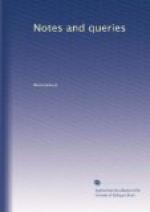“—We men of yore
Were versed in all the knowledge you can
mention.”
The operations of the two machines appear to be precisely the same: the only difference being the Sir Kenelm’s was an experimental one, made for the purpose of investigating the process of nature; while Cantelo’s, in accordance with “the spirit of the iron time,” is a practical one, made for the purposes of utility and profit. Sir Kenelm’s Treatise appears to have been first published in the year 1644.
HENRY KERSLEY.
Corpus Christi Hall, Maidstone.
* * * * *
ETYMOLOGY OF THE WORD “PARLIAMENT.”
It has been observed by a learned annotator on the Commentaries of Blackstone, that, “no inconsiderable pains have been bestowed in analysing the word ‘Parliament;’” and after adducing several amusing instances of the attempts that have been made (and those too by men of the most recondite learning) to arrive at its true radical properties, he concludes his remarks by observing that
“‘Parliament’ imported originally nothing more than a council or conference, and that the termination ‘ment,’ in parliament, has no more signification than it has in impeachment, engagement, imprisonment, hereditament, and ten thouand others of the same nature.”
He admits, however, that the civilians have, in deriving testament from testari mentem, imparted a greater significance to the termination “ment.” Amidst such diversity of opinion, I am emboldened to offer a solution of the word “Parliament,” which, from its novelty alone, if possessing no better qualification, may perhaps recommend itself to the consideration of your readers. In my humble judgment, all former etymologists of the word appear to have stumbled in limine, for I would suggest that its compounds are “palam” and “mens.”
With the Romans there existed a law that in certain cases the verdict of the jury might be given CLAM VEL PALAM, viz., privily or openly, or in other words, by tablet or ballot, or by voices. Now as the essence of a Parliament or council of the people was its representative character, and as secrecy would be inconsistent with such a character, it was doubtless a sine qua non that its proceedings should be conducted “palam,” in an open manner. The absence of the letter “r” may possibly be objected to, but a moment’s reflection will cast it into the shade, the classical pronunciation of the word palam being the same as if spelt PARlam; and the illiterate state of this country when the word Parliament was first introduced would easily account for a phonetic style of orthography. The words enumerated by Blackstone’s annotator are purely of English composition, and have no correspondent in the dead languages; whilst testament, sacrament,




